The Angioedema Treatment Market is estimated to be valued at USD 6.5 billion in 2025 and is projected to reach USD 30.3 billion by 2035, registering a compound annual growth rate (CAGR) of 16.6% over the forecast period.
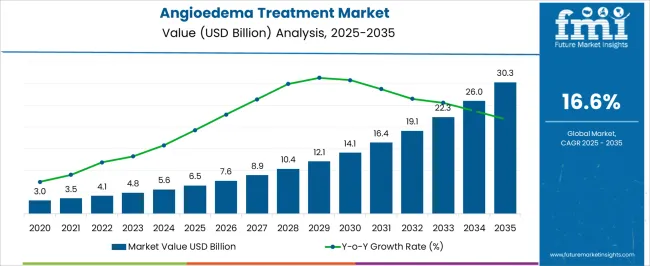
| Metric | Value |
|---|---|
| Angioedema Treatment Market Estimated Value in (2025 E) | USD 6.5 billion |
| Angioedema Treatment Market Forecast Value in (2035 F) | USD 30.3 billion |
| Forecast CAGR (2025 to 2035) | 16.6% |
The angioedema treatment market is showing consistent growth, driven by the rising prevalence of both hereditary and acquired forms of the condition and the increased focus on early and effective management. Greater awareness among healthcare providers and patients regarding timely diagnosis and treatment has enhanced demand for therapeutic options that provide rapid relief and long-term management. Advancements in drug development, including the refinement of antihistamines, corticosteroids, and newer biologics, are contributing to broader adoption across healthcare systems.
Increased patient visits to emergency care facilities for acute attacks, combined with the availability of specialized treatment centers, are further shaping demand dynamics. Regulatory support for orphan drug designations and ongoing research into targeted therapies are paving the way for innovative solutions.
As healthcare systems place a stronger emphasis on reducing morbidity and improving patient quality of life, the market is positioned for steady expansion Rising investments in clinical trials, pipeline therapies, and improved distribution networks are expected to further strengthen market growth over the coming years.
The angioedema treatment market is segmented by drug class, end use, and geographic regions. By drug class, angioedema treatment market is divided into Antihistamines, Corticosteroids, Antigonadotropic agents, and Vasopressor. In terms of end use, angioedema treatment market is classified into Hospitals, Clinics, and Research Organizations. Regionally, the angioedema treatment industry is classified into North America, Latin America, Western Europe, Eastern Europe, Balkan & Baltic Countries, Russia & Belarus, Central Asia, East Asia, South Asia & Pacific, and the Middle East & Africa.
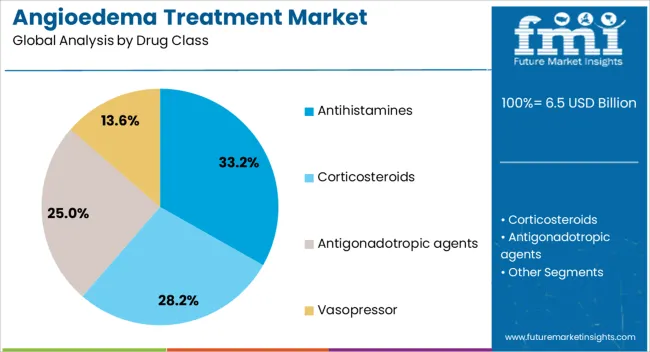
The antihistamines segment is projected to hold 33.2% of the angioedema treatment market revenue share in 2025, making it the leading drug class. This position is supported by the segment’s effectiveness in controlling histamine-mediated angioedema, particularly in cases linked to allergic reactions and idiopathic conditions. Antihistamines are widely preferred due to their rapid onset of action, favorable safety profile, and availability in both oral and injectable formulations.
The cost-effectiveness of antihistamines compared to other therapeutic options has reinforced their widespread adoption across both developed and emerging markets. Increased accessibility through over-the-counter availability and hospital pharmacies further contributes to the segment’s leadership.
Ongoing improvements in second- and third-generation antihistamines, offering reduced sedative effects and longer durations of action, are also enhancing their clinical utility As awareness of angioedema management grows and the need for immediate intervention remains critical, the antihistamines segment is expected to sustain its dominant share, supported by both clinical efficacy and strong market availability.
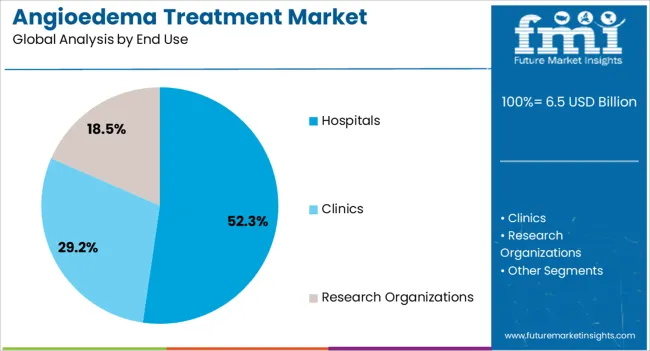
The hospitals segment is anticipated to account for 52.3% of the angioedema treatment market revenue share in 2025, positioning it as the leading end-use setting. This dominance is being driven by the high frequency of patients presenting to hospitals for emergency care during acute angioedema episodes, which often require immediate medical intervention. Hospitals are equipped with advanced diagnostic and therapeutic resources, including access to intensive care units and specialized drugs, which makes them the preferred setting for treatment.
Growing reliance on hospital-based care is also reinforced by the need for rapid administration of intravenous therapies and continuous monitoring in severe cases. Additionally, hospitals are central hubs for clinical trials and specialist consultations, which enhances their role in patient management.
The expansion of healthcare infrastructure, particularly in emerging economies, is increasing hospital capacity and accessibility, further supporting the segment’s share As awareness and diagnosis rates improve globally, hospitals are expected to remain the dominant channel for angioedema treatment, ensuring patient safety and effective outcomes.
Healthcare systems around the world are adopting the latest medical technology involving angioedema treatment solutions. The increasing geriatric population is also attributed to abnormal lifestyles and unhealthy eating habits. Furthermore, the rising cases of hereditary angioedema, along with the disorders related to it, such as appendicitis, and gastrointestinal issues, are fueling the sales of angioedema treatment solutions.
Majorly treated with medication, the rising cases of allergic angioedema and idiopathic angioedema fuel the sales of angioedema treatment solutions. The government invests in research and development programs. The higher cases of angioedema in developed nations such as the US and the UK are gaining traction in the angioedema treatment market.
Pharmaceuticals and research organizations work to process novel drugs and supportive treatments for angioedema. These medications improve medical facilities and health insurance along with advanced technology. Thus the market for angioedema treatment will boost in the coming years. The higher awareness of the disease and its complications has made people take the treatment seriously, adopting the angioedema treatment solutions.
Advanced technology states that swelling in hereditary angioedema patients is easily controlled with CRISPR treatment. The newly found CRISPR genome editing technology reduces the frequency of attacks in hereditary angioedema patients. Thus, the high-end research programs launched by governments and private entities help the market for angioedema treatment.
The primary treatment of ACEI-AAE is, first and foremost, discontinuation of the inciting drug and management of the airway. The resolution period lies between 24-72 hours. The rising demand for antihistamines, epinephrine, and steroids is to their requirements in different cases of angioedema. The increased involvement of healthcare facilities in dealing with mid-level diseases faster so that the maximum resources can be saved for chronic diseases fuels the market growth for angioedema treatments.
Allergies affect about 30% of the adults and 40% of children and are increasing day by day. It is the fifth leading cause of chronic diseases affecting approximately 50 million people in the United States. Angioedema is one of the common condition caused due to allergies and show sudden swelling under the skin surface.
It is also sad to be the most dangerous form of hives and can affect hands, feet, lips, eye lids and genitals. There are four different types of angioedema as allergic angioedema, idiopathic angioedema, drug-induced angioedema and hereditary angioedema.
The treatment of angioedema may include a normal physical examination, even though with proper medication angioedema cannot be completely cured but regular drugs can help in preventing the attacks in the patients. Allergic angioedema and idiopathic angioedema can be treated using combination drugs and helped relieving swelling. In case of severe cases of angioedema steroid injections may be needed.
In the United States it was reported that in 2010 the total spending on allergies was US$ 17.5 billion from which food allergies cost about US$ 25 million, thus people having severe allergies and changing life-style can be the major factors contributing the growth of the angioedema treatment market.
The increasing rate of angioedema in the United States and other regions has triggered the demand for hospitalization and advancements in the treatment of angioedema. Though angioedema can be treated, it cannot be completely cured and rapidly increasing allergic conditions can give rise to epidemiology, such factors are responsible for hindering the growth of the market. The crucial challenge for the pharmaceuticals is enhance and advance the treatment for angioedema and come up with better drugs.
Globally the number of allergies and allergy conditions as angioedema are rapidly increasing, thus the angioedema treatment market is estimated to have an enormous growth during the forecast period (2025-2026). Pharmaceuticals and research organizations are working to develop novel drug and treatments for angioedema. Improving medical facilities and health insurances along with advance technology the market for angioedema treatment will boost in coming years.
On the basis of region presence, Angioedema Treatment market is segmented into five key regions: North America, Latin America, Europe, Asia Pacific, and Middle East & Africa.
Currently, North America dominates the global market for Angioedema Treatment due to high prevalence rate of sinusitis, followed by Europe. According to the epidemiology took place in America in 2010 had increased the hospitalization rate and increasing allergies in adults and children have triggered the growth rate of angioedema. However factors such as climatic conditions inappropriate for angioedema patients and lack of awareness among people about angioedema will hamper the market growth in regions like Asia-pacific and RoW.
The rising cases of drug-induced angioedema due to the increased application of drugs among all generations adds new elements to the angioedema treatment process. The additions involve the usage of alternative medication and symptoms-based treatment. Furthermore, the increased usage of drugs in the US has pushed healthcare services to focus on minimizing the swelling of the eyes, lips, genitals, hands, and feet. Drug-infused angioedema is diagnosed through blood and allergy tests that determine the type of angioedema.
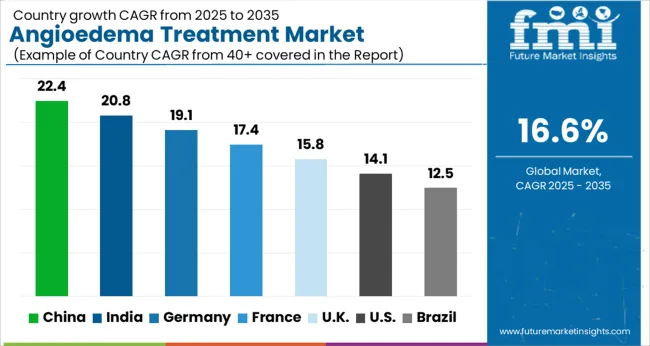
| Country | CAGR |
|---|---|
| China | 22.4% |
| India | 20.8% |
| Germany | 19.1% |
| France | 17.4% |
| UK | 15.8% |
| USA | 14.1% |
| Brazil | 12.5% |
The Angioedema Treatment Market is expected to register a CAGR of 16.6% during the forecast period, exhibiting varied country level momentum. China leads with the highest CAGR of 22.4%, followed by India at 20.8%. Developed markets such as Germany, France, and the UK continue to expand steadily, while the USA is likely to grow at consistent rates. Brazil posts the lowest CAGR at 12.5%, yet still underscores a broadly positive trajectory for the global Angioedema Treatment Market. In 2024, Germany held a dominant revenue in the Western Europe market and is expected to grow with a CAGR of 19.1%. The USA Angioedema Treatment Market is estimated to be valued at USD 2.5 billion in 2025 and is anticipated to reach a valuation of USD 9.2 billion by 2035. Sales are projected to rise at a CAGR of 14.1% over the forecast period between 2025 and 2035. While Japan and South Korea markets are estimated to be valued at USD 349.5 million and USD 195.8 million respectively in 2025.
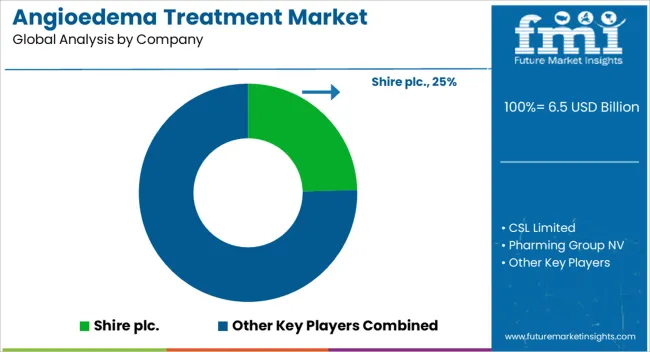
| Item | Value |
|---|---|
| Quantitative Units | USD 6.5 Billion |
| Drug Class | Antihistamines, Corticosteroids, Antigonadotropic agents, and Vasopressor |
| End Use | Hospitals, Clinics, and Research Organizations |
| Regions Covered | North America, Europe, Asia-Pacific, Latin America, Middle East & Africa |
| Country Covered | United States, Canada, Germany, France, United Kingdom, China, Japan, India, Brazil, South Africa |
| Key Companies Profiled | Shire plc., CSL Limited, Pharming Group NV, Ionis Pharmaceuticals, Inc., iBio Inc., and BioCryst Pharmaceuticals, Inc. |
The global angioedema treatment market is estimated to be valued at USD 6.5 billion in 2025.
The market size for the angioedema treatment market is projected to reach USD 30.3 billion by 2035.
The angioedema treatment market is expected to grow at a 16.6% CAGR between 2025 and 2035.
The key product types in angioedema treatment market are antihistamines, corticosteroids, antigonadotropic agents and vasopressor.
In terms of end use, hospitals segment to command 52.3% share in the angioedema treatment market in 2025.






Our Research Products

The "Full Research Suite" delivers actionable market intel, deep dives on markets or technologies, so clients act faster, cut risk, and unlock growth.

The Leaderboard benchmarks and ranks top vendors, classifying them as Established Leaders, Leading Challengers, or Disruptors & Challengers.

Locates where complements amplify value and substitutes erode it, forecasting net impact by horizon

We deliver granular, decision-grade intel: market sizing, 5-year forecasts, pricing, adoption, usage, revenue, and operational KPIs—plus competitor tracking, regulation, and value chains—across 60 countries broadly.

Spot the shifts before they hit your P&L. We track inflection points, adoption curves, pricing moves, and ecosystem plays to show where demand is heading, why it is changing, and what to do next across high-growth markets and disruptive tech

Real-time reads of user behavior. We track shifting priorities, perceptions of today’s and next-gen services, and provider experience, then pace how fast tech moves from trial to adoption, blending buyer, consumer, and channel inputs with social signals (#WhySwitch, #UX).

Partner with our analyst team to build a custom report designed around your business priorities. From analysing market trends to assessing competitors or crafting bespoke datasets, we tailor insights to your needs.
Supplier Intelligence
Discovery & Profiling
Capacity & Footprint
Performance & Risk
Compliance & Governance
Commercial Readiness
Who Supplies Whom
Scorecards & Shortlists
Playbooks & Docs
Category Intelligence
Definition & Scope
Demand & Use Cases
Cost Drivers
Market Structure
Supply Chain Map
Trade & Policy
Operating Norms
Deliverables
Buyer Intelligence
Account Basics
Spend & Scope
Procurement Model
Vendor Requirements
Terms & Policies
Entry Strategy
Pain Points & Triggers
Outputs
Pricing Analysis
Benchmarks
Trends
Should-Cost
Indexation
Landed Cost
Commercial Terms
Deliverables
Brand Analysis
Positioning & Value Prop
Share & Presence
Customer Evidence
Go-to-Market
Digital & Reputation
Compliance & Trust
KPIs & Gaps
Outputs
Full Research Suite comprises of:
Market outlook & trends analysis
Interviews & case studies
Strategic recommendations
Vendor profiles & capabilities analysis
5-year forecasts
8 regions and 60+ country-level data splits
Market segment data splits
12 months of continuous data updates
DELIVERED AS:
PDF EXCEL ONLINE
Treatment-Resistant Hypertension Management Market Size and Share Forecast Outlook 2025 to 2035
Treatment-Resistant Depression Treatment Market Size and Share Forecast Outlook 2025 to 2035
Treatment Pumps Market Insights Growth & Demand Forecast 2025 to 2035
Pretreatment Coatings Market Size and Share Forecast Outlook 2025 to 2035
Air Treatment Ozone Generator Market Size and Share Forecast Outlook 2025 to 2035
CNS Treatment and Therapy Market Insights - Trends & Growth Forecast 2025 to 2035
Seed Treatment Materials Market Size and Share Forecast Outlook 2025 to 2035
Acne Treatment Solutions Market Size and Share Forecast Outlook 2025 to 2035
Scar Treatment Market Overview - Growth & Demand Forecast 2025 to 2035
Soil Treatment Chemicals Market
Water Treatment System Market Size and Share Forecast Outlook 2025 to 2035
Water Treatment Chemical Market Size and Share Forecast Outlook 2025 to 2035
Algae Treatment Chemical Market Forecast and Outlook 2025 to 2035
Water Treatment Market Size and Share Forecast Outlook 2025 to 2035
Water Treatment Ozone Generator Market Size and Share Forecast Outlook 2025 to 2035
Water Treatment Equipment Market Size and Share Forecast Outlook 2025 to 2035
Burns Treatment Market Overview – Growth, Demand & Forecast 2025 to 2035
CRBSI Treatment Market Insights - Growth, Trends & Forecast 2025 to 2035
Water Treatment Polymers Market Growth & Demand 2025 to 2035
Asthma Treatment Market Forecast and Outlook 2025 to 2035

Thank you!
You will receive an email from our Business Development Manager. Please be sure to check your SPAM/JUNK folder too.
Chat With
MaRIA